Disciple: When Companionship Becomes Relationship
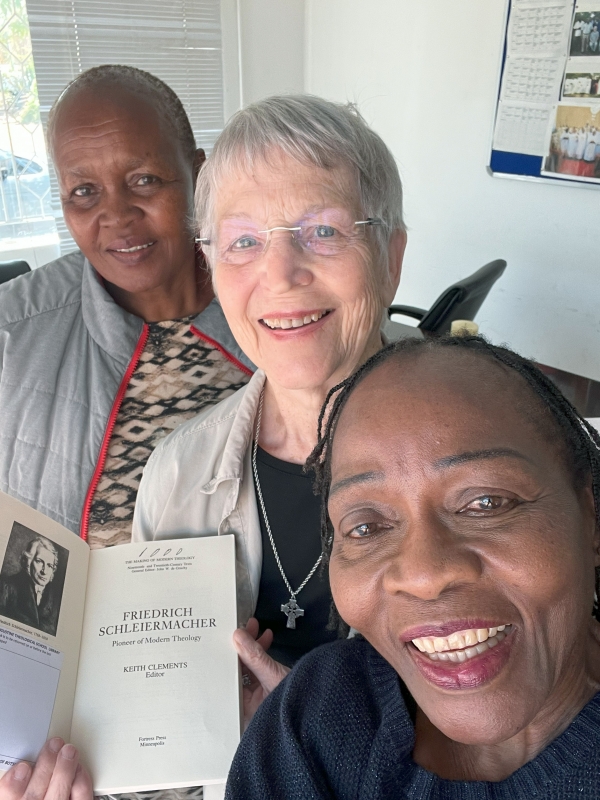
The relationship between the Dioceses of North Carolina and Botswana continues to grow and thrive
By Christine McTaggart and friends
“He has showed you, O man, what is good;
and what does the Lord require of you
but to do justice, and to love kindness,
and to walk humbly with your God?” (Micah 6:8)
The Diocese of North Carolina first entered into a formal companion relationship with the Diocese of Botswana in 2008. Since that time, the relationship has grown and deepened as the dioceses have engaged in pilgrimages and youth exchanges, a “hammer and nails” project at St. Andrew’s in the Selebi Phikwe parish, work with HIV/AIDS initiatives, involvement with the Holy Cross hospice and a shared ministry among the Episcopal Church Women of North Carolina and the Anglican Women’s Fellowship and Mothers Union in Botswana.
Perhaps one of the most long-lasting impacts of the relationship is the growth of the St. Augustine Theological School (SATS) in Gaborone. For years, Botswana lived with a severe shortage of priests, with only a handful of ordained clergy living in the area. Options for those who wished to pursue training and ordination were limited. Early steps toward changing that came in 2010, when the Rev. Leon Spencer, a priest in the Diocese of North Carolina and former chair of the Botswana Companion Link Committee, and the Rev. James Amanze, the chair of the Diocese of Botswana’s companion link committee, spent months in Botswana holding workshops and discerning formation possibilities. The Diocese of Botswana wanted the training to be local and focused, alongside a strong lay education, on a track to ordination.
[Image: Florence Bogopa, Martha Alexander and Pearl Lebatha holding the 1,000th book entered in the library catalogue. Photos throughout courtesy of Alexander]
The result of that discernment, the St. Augustine Theological School came to be in 2012 with its first class of 13 ordinands, who became the graduates ordained in 2014. Since the school’s inception, the Diocese of North Carolina has remained a partner and offered support in many forms: financial, material and educational, including the return of Spencer and the Rev. Fred Horton to teach, the Support a Seminarian initiative and the training of Education for Ministry mentors.
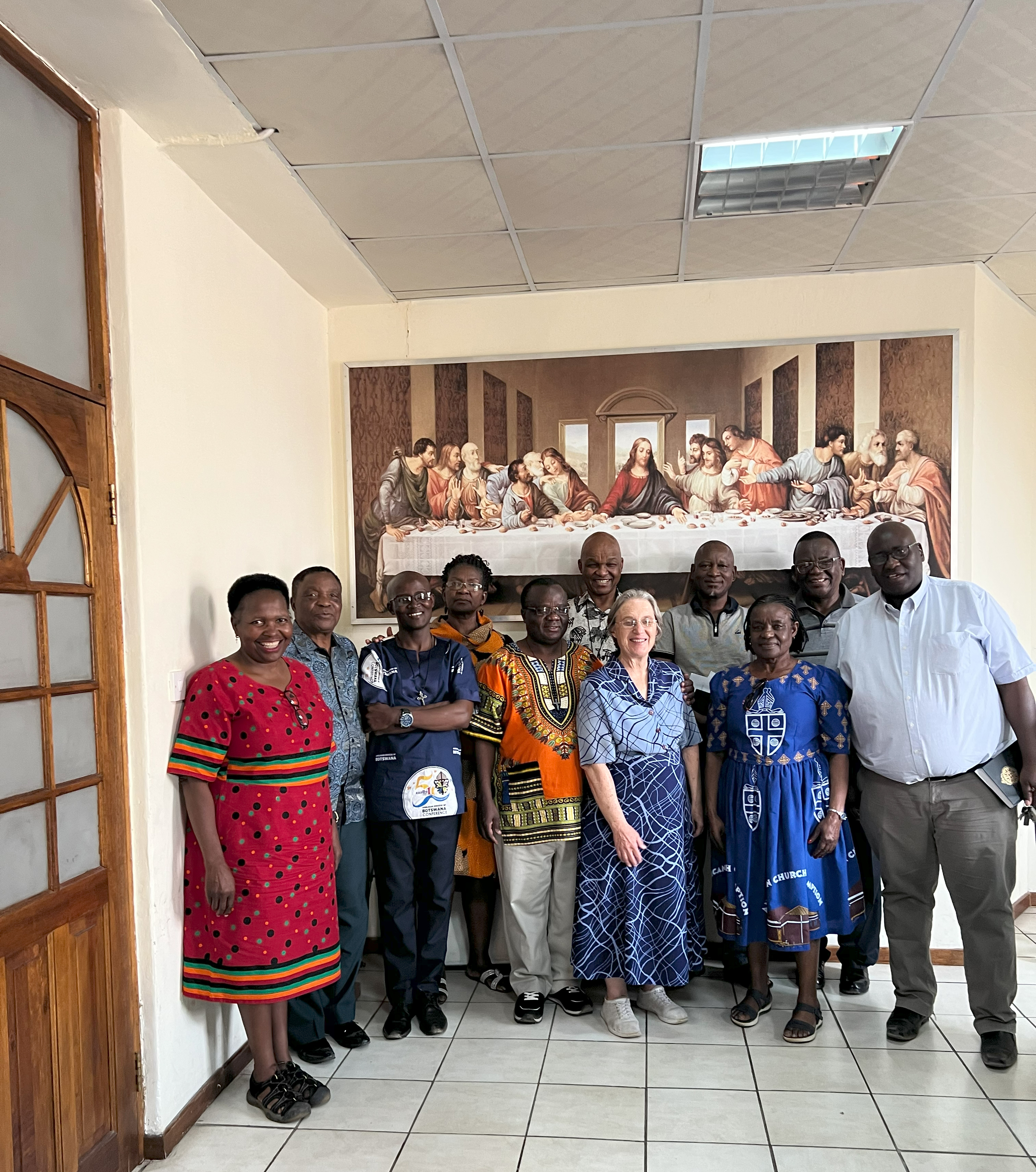
Today, SATS is thriving. The last three years especially have seen the school make significant technological and structural improvements, all of which contributed to the achievement of accreditation by the Botswana Qualifications Authority. Even more significantly, the offerings of the school were recently approved for expansion, and SATS is now accredited for their lay ministry program as well as their ordination training. Graduates of SATS are prepared for careers in ministry, church administration, counseling, social work, teaching and community development.
The impact of these opportunities has only begun to be imagined, especially following a historic moment last fall. Though women were not permitted to become ordained at the time the school was founded, from its first day, SATS welcomed and trained women for ordination as the Diocese of Botswana continued to advocate for them. In November 2023, the diocese’s perseverance paid off, and women won the province vote that now allows them to be ordained.
“It is with great joy that we have learned that sometime, perhaps within the next year, all 14 of the women who have been trained for the priesthood will actually begin to serve as God has called them to do,” said the Rev. Miriam Saxon, chair of the diocesan Botswana Companion Link Committee. “They hope to join their male classmates at the next ordination and no longer merely watch from the sidelines. They will bring many new gifts to the church, and they are prepared for the difficulties of acceptance of this change, not unlike the difficulties faced by the first women ordained here in the United States.”
[Image: Members of the Diocese of Botswana’s companion link committee gather at Holy Cross Cathedral.]
ONE BOOK AT A TIME
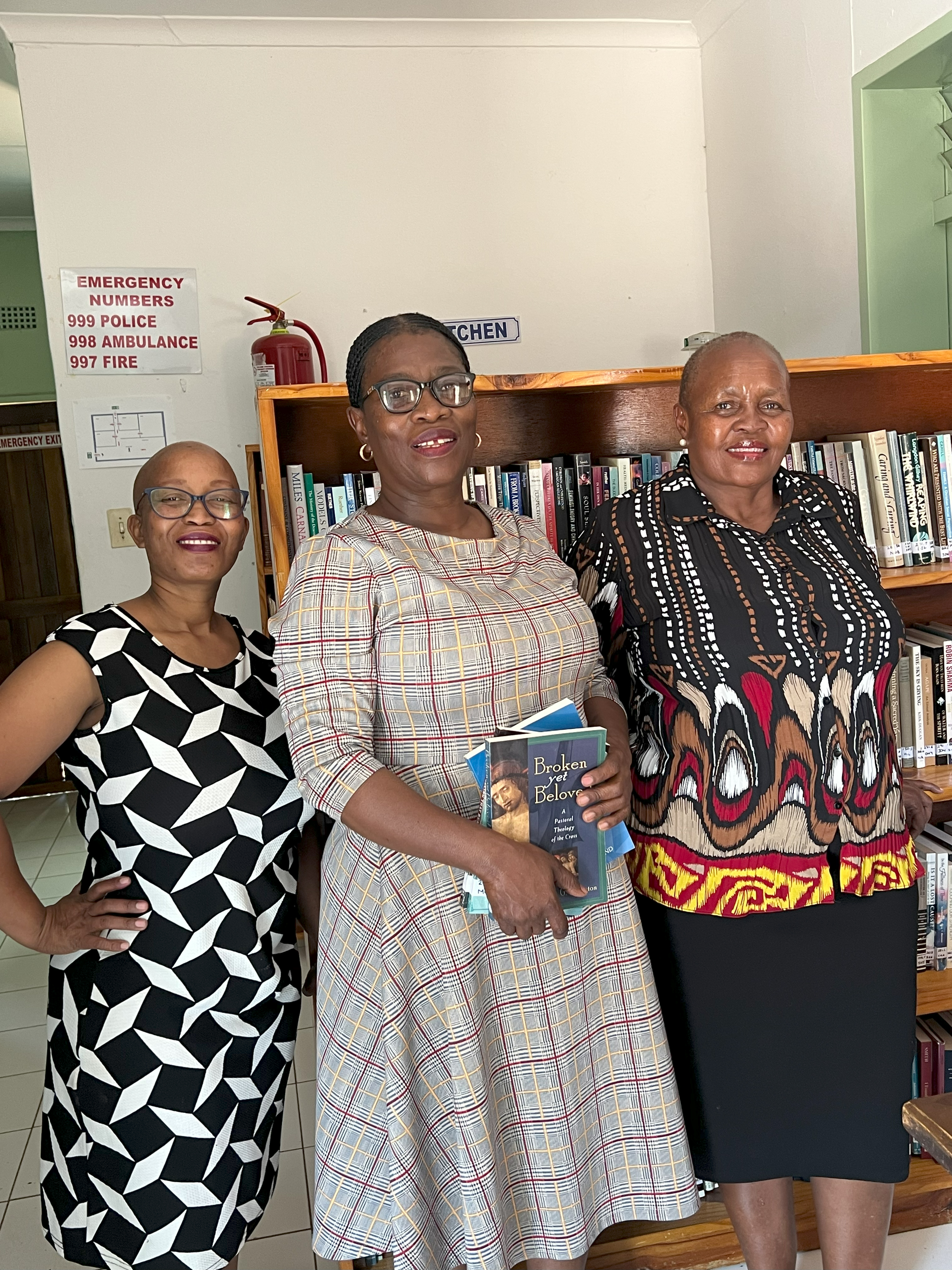
It has been an honor from the start to walk with the Diocese of Botswana as the St. Augustine Theological School was envisioned and started. It has been a gift to our diocesan relationship to be able to take part in the school’s journey, assisting where we could and celebrating every success achieved by our friends. The journey is not yet complete, and the Diocese of North Carolina is grateful for the chance to support our diocesan siblings in whatever way is helpful, whenever the call comes. One diocesan parishioner had exactly that experience just a few months ago.
Martha Alexander is a well-known figure in the Diocese of North Carolina. Though many recognize and know her as the long-serving chair of the Dispatch of Business committee at our annual conventions, Alexander has served in just about every way a person can serve in a volunteer diocesan capacity.
In fall 2022, Alexander became aware of another kind of calling, this one an internal calling to serve the St. Augustine Theological School, specifically in the library. Throughout 2023, she discerned this call, participating in missionary orientation alongside members of the Young Adult Service Corp (YASC) and becoming an Episcopal Volunteer in Mission (EVIM). In late summer, she departed for a two-month stay in Gaborone to assist in the SATS library.
[Image: Cecilia Pule-Lekang, SATS librarian; volunteer Yvonne Moatlhodi; and Florence Bogopa, SATS administrator, show off shelves full of cataloged books.]
For many of us in the United States, when we think of any institution of higher learning, we simply assume that a library is a part of that institution. But what we take for granted is a hard-earned resource in other places. When SATS was founded, the first students did not have textbooks, let alone a library to which they could turn.
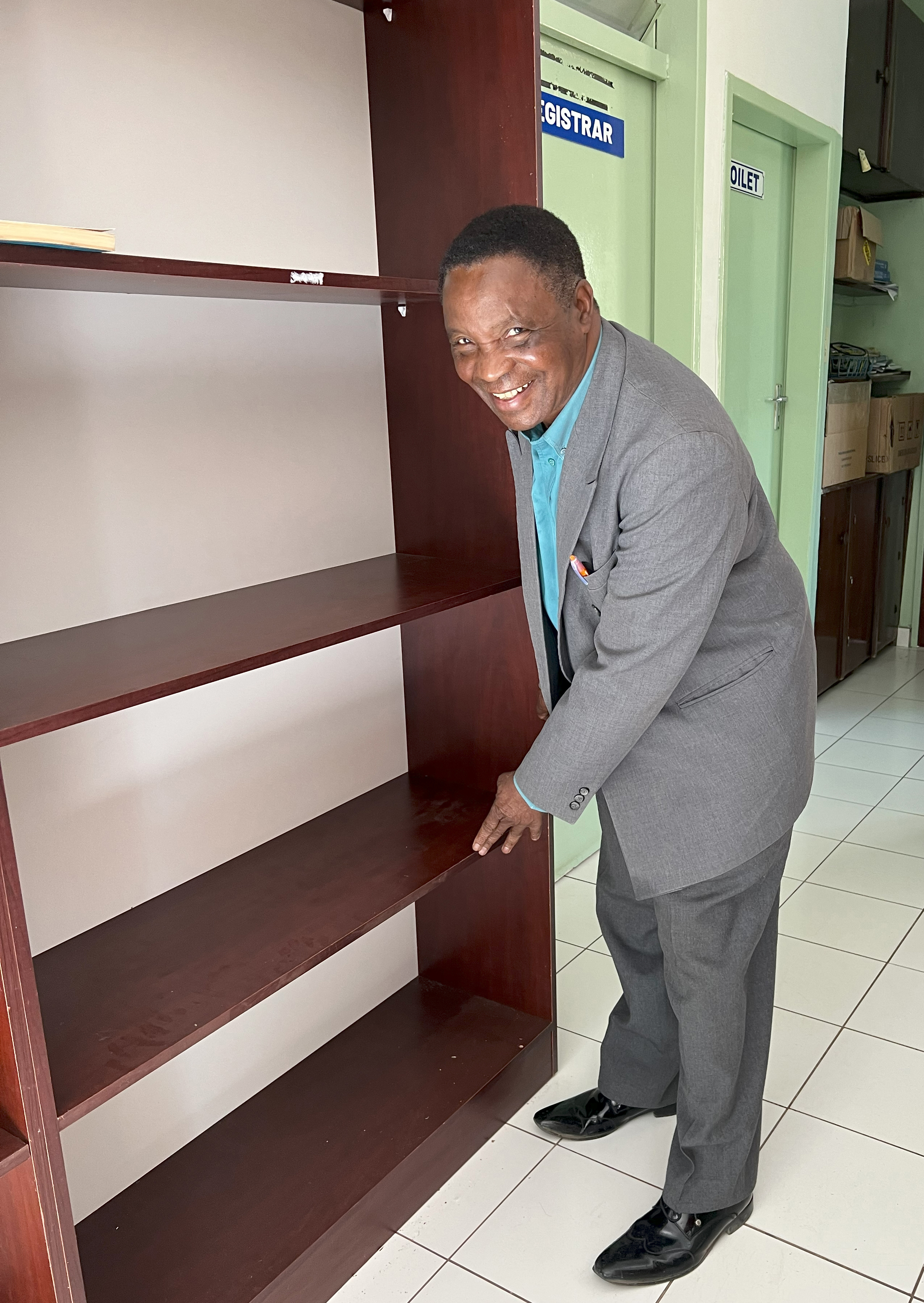
- Two labels, one in the front of the book identifying it as belonging to the St. Augustine Theological School and one in back to track return due dates. All labels are cut and glued by hand.
- Entry into the computer, including the book’s title, author, category, ISBN, publication date, publisher and provenance, noting whether the book was purchased or a gift along with all attendant details.
- The assignment of a serial number, which needs to be entered in the online database as well as written by hand into the book.
- A label on each book’s spine with the first three numbers of the Dewey decimal system and the first three letters of the author’s or editor’s last name. Each label is created and affixed by hand.
- Review by the librarian of any book without all the necessary information.
- Shelving, only when all of the above is completed.
As one might imagine, the building of the library is a detail-oriented, time-consuming and labor-intensive process. When Alexander arrived in Gaborone, 260 books had been cataloged. Her task during her stay was to continue the work to process and shelve as many books as possible.
[Image: The Rev. James Amanze, principal of the St. Augustine Theological School (SATS) in Botswana, shows off some of the bookshelves he fixed.]
“Even though I worked as an assistant librarian for four months while living in Montreal,” said Alexander, “I forgot how much time and effort it is to take a book in hand and prepare it to be shelved! Without the volunteer help from my new friends and my visitors, not much could have been accomplished.”
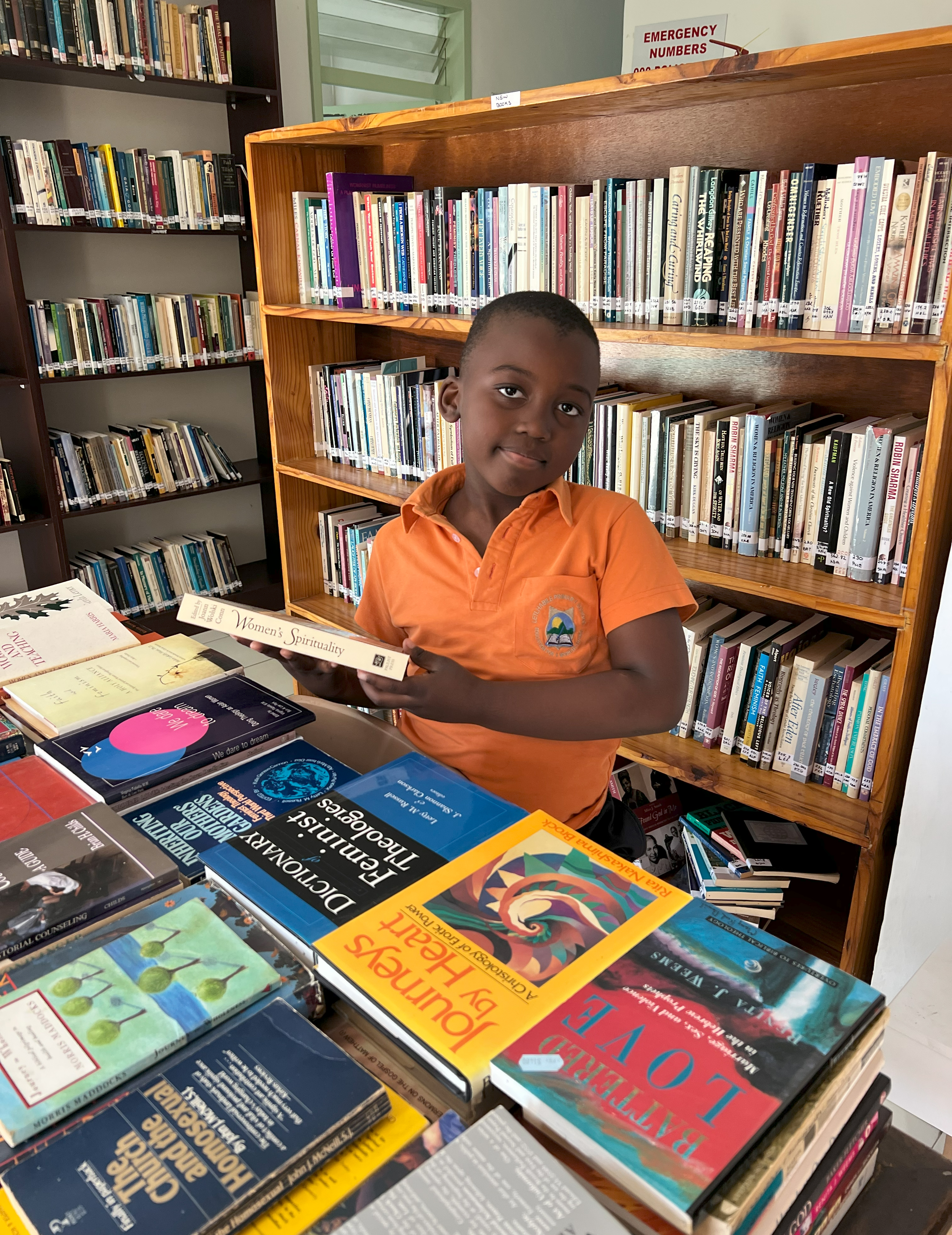
She worked under the guidance of Amanze, whose formal title as principal of the school is Canon Professor; Florence Bogopa, administrator for SATS; and Cecilia Pule-Lekang, St. Augustine’s school librarian. Other volunteers working alongside Alexander were Claire Hamilton, Mosidi Sam, Gladys Mudereri, Susan Mogwera, Yvonne Moatlhodi, Precious Mosarwe, and even Bogopa’s grandchildren, Josh and Bella, aged six and five. During Alexander’s time there, visitors lent a hand, including some who made it a family affair. Alexander’s daughter, Tasse Little, and family friend Laura Blake came for a visit and made sure time in the library was on the itinerary alongside sightseeing and other travel plans. Amanze’s son, Edwin, came to the rescue when computer issues occurred. Saxon also arrived in Botswana during Alexander’s stay there and included time in the library amidst her itinerary of conducting women’s leadership workshops and guest preaching.
“One of the highlights of my work was the influx of people stopping by to say ‘hello,’ to conduct business or to inquire about the school,” said Alexander. “There was always time for tea and a delicious lunch usually prepared by Florence and her friends who also were volunteers.”
The combined efforts of SATS staff, Alexander, guest volunteers and others proved the adage of how individual contributions can create big collective impacts. At the end of Alexander’s two-month stay, more than 1,000 books had been cataloged and readied for the shelves, bringing the total to 1,345. But the work will never be done.
“The library is a living part of education, and there will always be more to add,” said Alexander.
[Image: Bogopa’s grandson, Josh, helped with the shelving efforts.]
BONDED BY FAITH
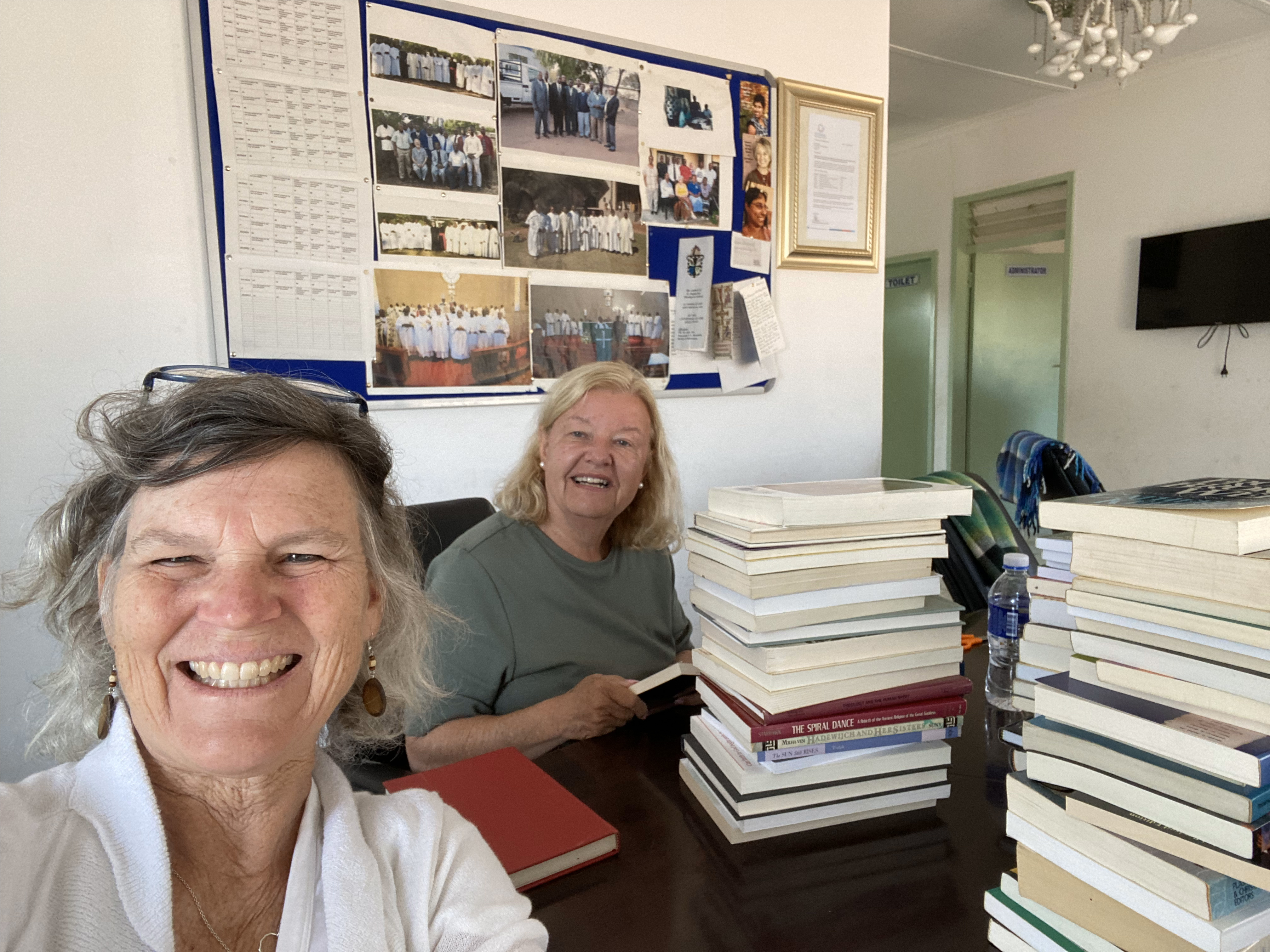
Though she went primarily to volunteer in the SATS library, Alexander got the chance to experience Botswana during her time there, adventures she recounted via letters to family and friends detailing her work, escapades, excursions and time spent with friends who became family and strangers who became friends.
She experienced wildlife and national parks, local cuisine and culture. She helped plan a surprise birthday celebration for Amanze before others made the most of the chance to celebrate her own. And, above all, she came together with friends and strangers again and again via worship.
It comes as no surprise that many of the moments recounted by Alexander in her travel missives centered around worship. Almost all of the areas of connection in our companion agreement with the Diocese of Botswana are focused around formation and worship. When anyone from the Dioceses of Botswana and North Carolina comes together, the uniqueness and gifts of cultures are celebrated while the common bonds of faith bring us closer together.
[Image: Alexander’s daughter, Tasse Little, and family friend Laura Blake visited SATS and helped with the cataloging efforts.]
“Once I arrived in Gaborone, I was well taken care of,” said Alexander. “I was welcomed and give thanks to Bishop Metlha [Beleme] for his work in the diocese and his commitment to embracing my time there, as well as Susan, Father James, Florence, Cecilia and all the others I met. I enjoyed my time at the school as I made new friends, learned new skills, and had the opportunity to visit some of the churches as well as Francistown for two days. In only my second week there, when I was asked about plans for the evening, my response was ‘I’m going home,’ and I didn’t mean Charlotte. The hospitality, kindness and generosity were overwhelming. I felt like family. And I was shown in various ways by the people of Botswana the true meaning of Micah 6:8, and my experience there has made a difference in my life.”
MORE THAN COMPANIONS
The connection between the Dioceses of North Carolina and Botswana has become more than companionship. It has become a deep and abiding bond that has forged relationships and created lasting impact.
All are invited to enter into this relationship, and it can be as simple as prayer. To learn more about the ways you and your church can connect with our Botswana companions, click here.
Christine McTaggart is the communications director for the Diocese of North Carolina. We are also deeply grateful to the Rev. Leon Spencer, the Rev. Miriam Saxon and Martha Alexander for their contributions to this article.
Tags: North Carolina Disciple
